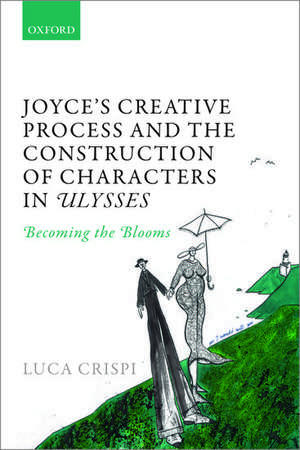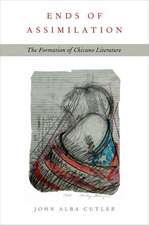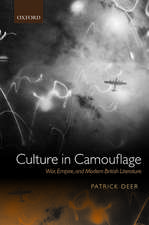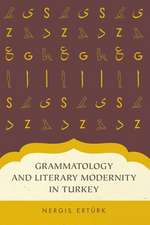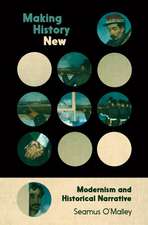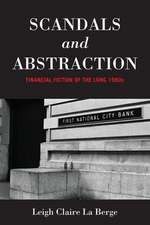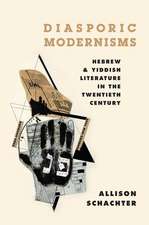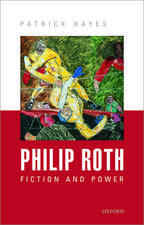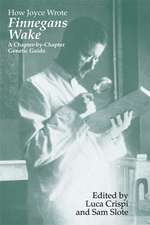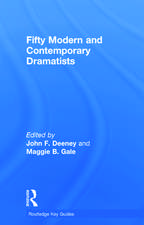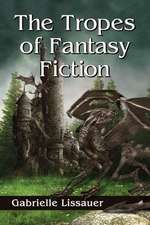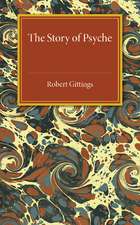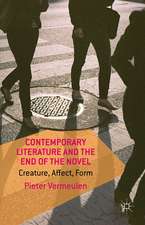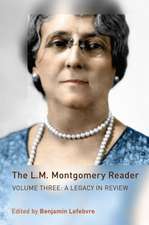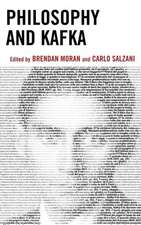Joyce's Creative Process and the Construction of Characters in Ulysses: Becoming the Blooms
Autor Luca Crispien Limba Engleză Paperback – 17 iun 2019
Preț: 279.78 lei
Preț vechi: 320.34 lei
-13% Nou
Puncte Express: 420
Preț estimativ în valută:
53.54€ • 56.04$ • 44.56£
53.54€ • 56.04$ • 44.56£
Carte disponibilă
Livrare economică 26 februarie-04 martie
Preluare comenzi: 021 569.72.76
Specificații
ISBN-13: 9780198834175
ISBN-10: 0198834179
Pagini: 368
Dimensiuni: 156 x 234 x 20 mm
Greutate: 0.54 kg
Editura: OUP OXFORD
Colecția OUP Oxford
Locul publicării:Oxford, United Kingdom
ISBN-10: 0198834179
Pagini: 368
Dimensiuni: 156 x 234 x 20 mm
Greutate: 0.54 kg
Editura: OUP OXFORD
Colecția OUP Oxford
Locul publicării:Oxford, United Kingdom
Recenzii
sets an important mark as paradigm to be emulated in the present phase of Joyce studies in which concern with the genetics of Joyce's works and their texts is distinctly gaining ground. It is Luca Crispi's pioneering achievement to have lucidly and soundly mapped the field in terms both of material substance available to work on and essentially, too, of method. Under the methodological aspect, indeed, his book is to be recommended widely beyond the confines of James Joyce studies as exemplary of how to conduct genetic criticism, and how, and on what manner of material grounds, to teach it.
Becoming the Blooms is an unmissable book. Critics of Ulysses will want to have a copy on their desk for ready consultation. Nowhere else will you find such a staggering elucidation of the characters, their lives and relations, and of Joyces manuscripts.
...I expect to return frequently to Joyce's Creative Process and the Construction of Characters in "Ulysses," not for its chronological arrangement of the Bloom's lives or for its often-repeated conclusions, but for the model of genetic criticism that it offers and especially Lunita Laredo showing up a week before publication, the evolving explanations of Bloom's courtship hesitancies, Joyce plundering Gogarty's memory of lying on Howth Hill, and all the other tantalizing details that Crispi offers of Joyce at work.
Becoming the Blooms cautiously humanises the often bewilderingly complex study of the Joycean textual process.
Luca Crispi has given us a new format and focus for Joyce studies, providing a fine model to authors who are engaged in archival research, genetic studies, and character development ... if you are inclined to follow, he will take you down into the underworld of genetic Joyce studies.
Luca Crispis new book is both an argument for genetic criticism and an excellent display of its fruits.
A significant addition to Joyce studies. The books extensive research and distinctive methodology allow Crispi to demonstrate rich and valuable insights about the compositional process of Ulysses, representing its position as a vital book for all Joyceans as well as any scholar working in genetic studies.
a thorough and thoroughly original analysis of Ulysses ... Crispi's book serves as an object lesson in how scholarship can improve our understanding and enjoyment of literature.
Luca Crispi's meticulously researched and superbly presented study is important both for the light it throws on Joyce's creative methods and, more generally, for its challenge to many of our assumptions about the way fictional characters are brought into being. Crispi asks what the surviving manuscripts of Ulysses can tell us about the evolution of Leopold and Molly Bloom as the novel developed, and discovers a surprisingly fluid process of revision, accretion and transferral of characteristics. The result is a penetrating account of one of the most astonishing feats of literary creativity of the twentieth century.
original, important, innovative, well-researched, and impeccably produced ... the book soars.
Joyce's Creative Process marks a turning point in the James Joyce studies because it modifies the pedagogy concerning Ulysses, a novel regularly taught in undergraduate classes. Tackling a term as central and apparently easy to grasp as "character," Crispi demonstrates that no reading of Ulysses can avoid grappling with the genesis of the text or tapping its evolutionary archive, here synthesized with rare clarity. One cannot deny the centrality of characterization --the fictional representation of human beings when they become beings of paper--in the study of narratives. By making us revise our assumptions about the main characters of Ulysses, this book revolutionizes the study of James Joyce as a whole.
This is the book in which genetic criticism of modernist writing properly comes of age, demonstrating that it can not only extend our knowledge of the mutations a text undergoes and our sense of its open-endedness, but also genuinely and subtly illuminate the myriad intricate movements of the creative process, and indeed transform interpretations. Crispi's learning is formidable, his archival research dedicated, authoritative and immensely assiduous, and his responsiveness to textual detail impeccable. The result is a magisterial contribution, both to Joyce scholarship, and to the study of modernist literature in general.
The scholarship ... is extraordinary in its detail, resulting in a nuanced illumination of the complexity of the characters [in Ulysses].
Becoming the Blooms is an unmissable book. Critics of Ulysses will want to have a copy on their desk for ready consultation. Nowhere else will you find such a staggering elucidation of the characters, their lives and relations, and of Joyces manuscripts.
...I expect to return frequently to Joyce's Creative Process and the Construction of Characters in "Ulysses," not for its chronological arrangement of the Bloom's lives or for its often-repeated conclusions, but for the model of genetic criticism that it offers and especially Lunita Laredo showing up a week before publication, the evolving explanations of Bloom's courtship hesitancies, Joyce plundering Gogarty's memory of lying on Howth Hill, and all the other tantalizing details that Crispi offers of Joyce at work.
Becoming the Blooms cautiously humanises the often bewilderingly complex study of the Joycean textual process.
Luca Crispi has given us a new format and focus for Joyce studies, providing a fine model to authors who are engaged in archival research, genetic studies, and character development ... if you are inclined to follow, he will take you down into the underworld of genetic Joyce studies.
Luca Crispis new book is both an argument for genetic criticism and an excellent display of its fruits.
A significant addition to Joyce studies. The books extensive research and distinctive methodology allow Crispi to demonstrate rich and valuable insights about the compositional process of Ulysses, representing its position as a vital book for all Joyceans as well as any scholar working in genetic studies.
a thorough and thoroughly original analysis of Ulysses ... Crispi's book serves as an object lesson in how scholarship can improve our understanding and enjoyment of literature.
Luca Crispi's meticulously researched and superbly presented study is important both for the light it throws on Joyce's creative methods and, more generally, for its challenge to many of our assumptions about the way fictional characters are brought into being. Crispi asks what the surviving manuscripts of Ulysses can tell us about the evolution of Leopold and Molly Bloom as the novel developed, and discovers a surprisingly fluid process of revision, accretion and transferral of characteristics. The result is a penetrating account of one of the most astonishing feats of literary creativity of the twentieth century.
original, important, innovative, well-researched, and impeccably produced ... the book soars.
Joyce's Creative Process marks a turning point in the James Joyce studies because it modifies the pedagogy concerning Ulysses, a novel regularly taught in undergraduate classes. Tackling a term as central and apparently easy to grasp as "character," Crispi demonstrates that no reading of Ulysses can avoid grappling with the genesis of the text or tapping its evolutionary archive, here synthesized with rare clarity. One cannot deny the centrality of characterization --the fictional representation of human beings when they become beings of paper--in the study of narratives. By making us revise our assumptions about the main characters of Ulysses, this book revolutionizes the study of James Joyce as a whole.
This is the book in which genetic criticism of modernist writing properly comes of age, demonstrating that it can not only extend our knowledge of the mutations a text undergoes and our sense of its open-endedness, but also genuinely and subtly illuminate the myriad intricate movements of the creative process, and indeed transform interpretations. Crispi's learning is formidable, his archival research dedicated, authoritative and immensely assiduous, and his responsiveness to textual detail impeccable. The result is a magisterial contribution, both to Joyce scholarship, and to the study of modernist literature in general.
The scholarship ... is extraordinary in its detail, resulting in a nuanced illumination of the complexity of the characters [in Ulysses].
Notă biografică
Dr Luca Crispi teaches on the Anglo-Irish as well as the Modern and Contemporary Literature MA programmes at University College Dublin. He is founding co-editor of the Dublin James Joyce Journal and Associate Director of the Dublin James Joyce Summer School. He was contributing co-editor of How Joyce Wrote 'Finnegans Wake': A Chapter-by-Chapter Genetic Guide. Previously, Crispi was James Joyce and W.B. Yeats Research Scholar at the National Library of Ireland and co-curator of the exhibitions 'James Joyce and Ulysses at the National Library of Ireland' and 'Yeats: The Life and Works of W.B. Yeats', and was the James Joyce Scholar in Residence, the Poetry Collection, University at Buffalo, State University of New York.
